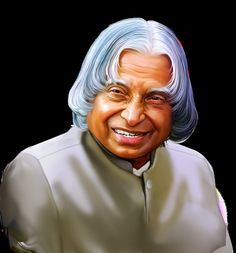The People’s President: APJ Abdul Kalam, The Missile Man of India

Ignited passion for science and the causes it means to the people across India and around the world. One word that could quite possibly describe this great man would be inspiring! Well known for his passionate nature, Abdul Kalam has had over 90% of his technical books translated into 18 Indian languages. He was also translated into many other languages, including German, Japanese, French, Spanish, and Arabic-Egyptian.
Dr. Dr. A.P.J. Abdul Kalam, affectionately called “The People’s President,” was one of the most inspiring leaders of our country. They guided India successfully to its Missile Man status in the wake of an armament race between both countries and their tests off-shore from each other in the Bay of Bengal in 1998.
Dr. Dr. A.P.J. Abdul Kalam is a rare thing today – an Indian leader whose thoughts and vision come across as transcendentally neutral, without a single trace of its indigenous context or BJP/ Congress party ideology. More than any other modern Indian statesman, he has been able to defy the narrow conjunctures of domestic debate while leading both lives in harmony.
Dr. A.P.J. Abdul Kalam Full Name?
Dr. A.P.J. Abdul Kalam full name is Avul Pakir Jainulabdeen Abdul Kalam.
Dr. A.P.J. Abdul Kalam Earlier life, Education, and family background?
Dr. A.P.J. Abdul Kalam was born on 14 October 1931 in Rameswaram, a town on the east coast of Tamil Nadu, to parents Sarojini and Dr. APJ Abdul Kalam. He was the only child of his parents and had an elder sister. His father, who worked as a mathematics teacher, died when A.P.J. was eleven years old.
Abdul Kalam attended Ramanathapuram Government High School and Madras Muslim College, where he completed his studies in 1954 with a BSc in Physics. He went on to pursue a Ph.D. in mathematics at universities in the United States of America and England. Eventually, he completed his degree from Bharathiar University in 1973 with a Ph.D. in Aerospace Science. This field would dominate his life and work once he returned to India.
Dr. A.P.J. Abdul Kalam married Sitara Sumbul Amin in 1957, and they had two daughters, Sakshi and Shreshta Kalam. In 1987, he married K J Radhika; the couple later divorced in 2003. Abdul Kalam has been living alone since then.
Dr. A.P.J. Abdul Kalam began his illustrious career as an aircraft design engineer with defense manufacturer Hindustan Aeronautics Limited (HAL). He designed the HAL HT-2 Megarab and was awarded a patent in 1962. In 1968, he joined DRDO as a professor of aerospace engineering; during his tenure at DRDO, he played an essential role in the early design aspects of the Pokhran 1 nuclear tests.
In 1969, his area at DRDO was expanded to other areas such as missile development. He was then moved in 1973 to the Defence Research and Development Laboratory (DRDL) in Bangalore, tasked with developing low-cost, readily available missiles and designs for military vehicles. Dr. A.P.J. Abdul Kalam also worked at SRI International from 1980 to 1986 as a senior scientist on projects like infrared satellites; these projects are credited with helping him through his Ph.D. thesis.
After 21 years (when he became a full professor of aerospace engineering at IIT, Madras in 1995), he was appointed as the Director of Andhra Pradesh Science and Technology Industrial Corporation for two years (1995 to 1996). He then moved back to the United States in 1998 to join the Toyota Research Institute, where he worked in their Advanced Research Laboratory on vehicle safety systems.
Dr. A.P.J. Abdul Kalam returned to India three months later to assist Mukherjee, who had been nominated as Vice President of India by the prime minister at that point; Kalam has claimed that during their collaboration, “the vice-president told me there was no problem between senior officials and scientists—both are helpful if they can work together” and seized upon this happy turn of events as a sign that Indian political leaders would support scientific research in an unbiased way.
In 1998, Prime Minister Atal Bihari Vajpayee asked for the scientists’ advice before choosing his cabinet. He was backed by President K.R. Narayanan, who offered “the highest position [for] a scientist in the world – that is, the prime minister” (Mukherjee). Dr. A.P.J. Abdul Kalam became one of Dr. Mukherjee’s key advisers. He drafted several crucial roles in India’s national defense needs (Sener Aydintasbas) for Sikkim and Andaman and Nicobar Islands (C. Santhanam) in 1999. “Nuclear Deterrence as Scientific Paradigm.
His views on alternative centers for nuclear deterrence made him propound a novel idea of a scientific defense system called ‘Deterrence through Science.” However, even today, this ‘scientific defense paradigm remains”—the core focal principle of India’s national security policies and doctrine.
He wrote several articles on the concepts of strategic theatre nuclear weapons (Abhinandan Singh). Dr. A.P.J. Abdul Kalam also expressed his views on safe houses, an important subject he suggested to the prime minister in 1999 (A.S.).
Dr. A.P.J. Abdul Kalam’s Personal Life?
When it comes to the life of Dr. APJ Abdul Kalam, little is known beyond what can be gleaned from his public speeches and writings. Kalam was the sixth of nine children of PARAMBATHI KRISHNAN and PUSAPATI KALAM. His father was a teacher, and his mother a homemaker. Kalam attended Madras Christian College and the University of Madras before completing his doctorate in nuclear physics from Bangalore University in 1958. The following year, he began post-doctoral studies at MIT’s Lincoln Laboratory, where he worked on guided missile principles with renowned scientist Richard Feynman.
In 1962 Kalam took a position as a lecturer at the Aeronautical Engineering Department at the Indian Institute of Technology (IIT) in Bombay (now Mumbai). He began work on an innovative missile design program that eventually led to the development of the Prithvi ballistic missile series. In 1970 Kalam succeeded NASIRUL QUMAR as India’s first Director General of Defence Research and Development Organisation (DDRO), a position he held until 1977.
Why is Dr. A.P.J. Abdul Kalam called as the “Missile Man of India”?
Dr. A.P.J. Abdul Kalam was widely regarded as one of India’s most respected scientists and educators; he became known as the “Missile Man of India” for developing the country’s ballistic missile program.
Kalam was educated at Madras Institute of Technology and Rashtriya Military College before receiving a doctorate in physics from the University of Delhi. Beginning his career as a research scientist at the Defence Research and Development Organisation (DRDO), he served as the organization’s Director-General (1983–1991).
Dr. A.P.J. Abdul Kalam Awards and Achievements?
Abdul Kalam has been awarded several accolades and honors for his science, engineering, and technology achievements. Here are a few:
– The Bharat Ratna, India’s highest civilian honor, in 2002.
– The Ramon Magsaysay Award for Public Service in 2001.
– Honorary Doctor of Science (DSc) from Stanford University, United States, in 1999.
– Honorary Doctorates from Morehouse College (1995), Kurukshetra University (1994), Pondicherry University (1994).
– Lifetime achievement award from the Indian Institute of Science (IISc), Bangalore, in 1994.
– Kalidas Samman, the highest civil award in Tamil Nadu, India, in 1993.
Dr. A.P.J. Abdul Kalam writes famous books?
-India 2020 (1998)
-Wings of Fire (1999)
-Ignited Minds (2002)
-The Luminous Sparks (2004)
-Guiding Souls (2005)
-Mission of India (2005)
-Inspiring Thoughts (2007)
-You Are Born to Blossom (2011)
-The Scientific India (2011)
-Target 3 Billion (2011)
-You are Unique (2012)
-Turning Points (2012)
-Indomitable Spirit (2013)
-Spirit of India (2013)
-Thoughts for Change (2013)
-My Journey (2013)
-Governance for Growth in India (2014)
-Manifesto for Change (2014)
-Forge Your Future (2014)
-Beyond 2020 (2014)
-The Guiding Light (2015)
-Reignited (2015)
-The Family and the Nation (2015)
-Transcendence My Spiritual Experiences (2015)
Dr. A.P.J. Abdul Kalam’s famous Quote?
Here are some famous quotes from Dr. A.P.J. Abdul Kalam:
“I am not merely an engine of technology; I am a vehicle for change.”
“Science and technology allow us to see things that other people cannot see and do things that others cannot do.”
“Since all technical progress is based on new ideas, it is essential that the younger generation be raised on new ideas.”
“I would like to see a high standard of education in the rural areas” Dr. A.P.J. Abdul Kalam.
Dr. A.P.J. Abdul Kalam’s Interesting Facts?
1. Dr. A.P.J. Abdul Kalam, or Dr. APJ Abdul Kalam for short, was a famed scientist, educator, and president of India from 2002 to 2007. He is considered one of the most influential figures in recent Indian history. His technology, aviation, and missile development work have made him internationally renowned.
2. Dr. Abdul Kalam was born on October 15, 1907, in a small village in the southern state of Tamil Nadu. He showed an early interest in science and mathematics, which his teachers at school encouraged. After completing his undergraduate studies at the Government College of Technology, Warangal, Kalam went on to study at the University of Madras (now Chennai), where he obtained a doctorate in physics in 1930.
3. Kalam started his career as a faculty member at the institute he had previously graduated from – the Government College of Technology, Warangal – where he worked until 1937. That year, he was appointed director of the Institute of Air Traffic Control (IATC), a position he held until 1949 when he was appointed director-general of Defence Research and Development (DDR&D), a post he held until 1962. During this time, he became the first Director of DRDO. He was appointed chairman of the Defence Research and Development Advisory Council from 1963 to 1966 and served as ambassador to China from 1967 to 1969.
Why is Dr. A.P.J. Abdul Kalam an inspiration to everyone?
The president of India, Dr. A.P.J. Abdul Kalam, re-ignited the civil society movement in India with his speeches and youthful attitude. He is admired and respected by people worldwide for his innovative thinking and passionate pursuit of education and science.
Conclusion
In this article, we look at the life and accomplishments of APJ Abdul Kalam; Kalam became an accomplished scientist and engineering pioneer while serving his country under various political administrations. Along with developing ballistic missiles for the Indian armed forces, Kalam is also known for his work on public speaking and student motivational programs. He passed away in 2015 at 83 after battling cancer for many years. A man loved and revered by many, APJ Abdul Kalam will be remembered long after his death as one of India’s most outstanding leaders.
Hey kids, how much did you like The People’s President: APJ Abdul Kalam, The Missile Man of India? Please share your view in the comment box. Also, please share this story with your friends on social media so they can also enjoy it, and for more such stories, please bookmark storiespub.com.
Suggested Article –
- An Essay on Diwali | Deepawali the Festival of Lights
- 1000 word essay on Mahatma Gandhi in English
- Essay on Environment for the Students in English
- Air Pollution Essay for the Students
- Essay on Child Labor for Students and Children
- Essay on My School for Students
- Essay on Newspaper
- Tree Essay for Students and Children
- Essay on Elephant for Students and Children in English?
- Essay on My Mother and why is she so Important
























